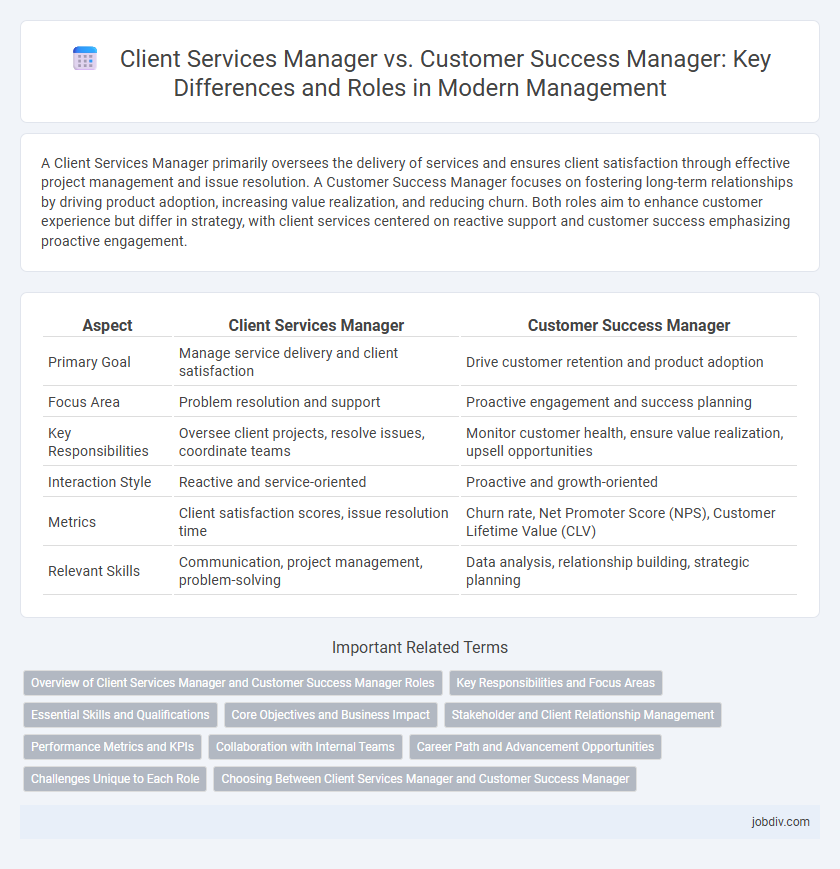A Client Services Manager primarily oversees the delivery of services and ensures client satisfaction through effective project management and issue resolution. A Customer Success Manager focuses on fostering long-term relationships by driving product adoption, increasing value realization, and reducing churn. Both roles aim to enhance customer experience but differ in strategy, with client services centered on reactive support and customer success emphasizing proactive engagement.
Table of Comparison
| Aspect | Client Services Manager | Customer Success Manager |
|---|---|---|
| Primary Goal | Manage service delivery and client satisfaction | Drive customer retention and product adoption |
| Focus Area | Problem resolution and support | Proactive engagement and success planning |
| Key Responsibilities | Oversee client projects, resolve issues, coordinate teams | Monitor customer health, ensure value realization, upsell opportunities |
| Interaction Style | Reactive and service-oriented | Proactive and growth-oriented |
| Metrics | Client satisfaction scores, issue resolution time | Churn rate, Net Promoter Score (NPS), Customer Lifetime Value (CLV) |
| Relevant Skills | Communication, project management, problem-solving | Data analysis, relationship building, strategic planning |
Overview of Client Services Manager and Customer Success Manager Roles
Client Services Managers focus on maintaining strong client relationships, managing service delivery, and ensuring client satisfaction through effective communication and problem resolution. Customer Success Managers prioritize proactive engagement, driving product adoption, and aligning customer goals with business outcomes to foster loyalty and retention. Both roles require strategic collaboration but differ in focus, with Client Services emphasizing service quality and Customer Success centering on long-term value realization.
Key Responsibilities and Focus Areas
Client Services Managers primarily oversee client relationships by managing service delivery, ensuring contract compliance, and addressing immediate client needs to maintain satisfaction. Customer Success Managers focus on long-term customer outcomes, driving product adoption, and ensuring customers achieve their desired business results through proactive support and strategic guidance. Both roles emphasize relationship management, but Client Services prioritize operational service execution while Customer Success centers on value realization and retention.
Essential Skills and Qualifications
Client Services Managers require strong project management, communication, and problem-solving skills, with experience in client relationship management and contract negotiation. Customer Success Managers excel in data analysis, customer journey mapping, and proactive engagement, often holding certifications in customer success methodologies and CRM software proficiency. Both roles demand emotional intelligence, strategic thinking, and a deep understanding of customer needs to drive retention and satisfaction.
Core Objectives and Business Impact
Client Services Managers focus on maintaining strong relationships and ensuring client satisfaction through effective communication and issue resolution, directly influencing client retention and revenue stability. Customer Success Managers prioritize proactive engagement and strategic support to help clients achieve long-term business goals, driving account growth and maximizing customer lifetime value. Both roles critically impact business success by enhancing client experience, but their core objectives differ in approach and metrics of performance.
Stakeholder and Client Relationship Management
Client Services Managers focus on maintaining long-term relationships by addressing clients' immediate needs and ensuring service delivery aligns with expectations, emphasizing operational efficiency and satisfaction. Customer Success Managers prioritize proactive engagement to drive customer outcomes and business growth, leveraging data analytics to anticipate challenges and foster stakeholder collaboration. Both roles require strong communication skills and relationship management but differ in strategic versus transactional client focus.
Performance Metrics and KPIs
Client Services Managers are often evaluated using metrics such as customer retention rate, service resolution time, and client satisfaction scores, reflecting their focus on maintaining ongoing client relationships and handling support issues efficiently. Customer Success Managers prioritize KPIs like product adoption rates, customer lifetime value (CLV), and churn reduction, emphasizing proactive engagement to ensure customers realize continuous value from the product. Both roles use Net Promoter Score (NPS) and renewal rates, but the distinction lies in CSMs driving growth and expansion, while CSMs optimize service delivery and problem resolution.
Collaboration with Internal Teams
Client Services Managers focus on coordinating with sales, marketing, and product teams to address client needs and ensure service delivery aligns with contractual agreements. Customer Success Managers collaborate closely with cross-functional teams, including product development and support, to optimize customer experience and drive long-term satisfaction and retention. Both roles require strong communication and teamwork to align internal resources with client goals, but Customer Success Managers emphasize proactive problem-solving and value realization.
Career Path and Advancement Opportunities
Client Services Managers often advance by deepening expertise in account management and developing leadership skills to oversee larger teams or regional portfolios. Customer Success Managers typically progress by mastering data-driven client retention strategies and transitioning into roles like Director of Customer Success or Head of Client Experience. Both paths offer growth in stakeholder management, but Customer Success roles increasingly emphasize proactive client engagement and strategic impact on revenue.
Challenges Unique to Each Role
Client Services Managers often face challenges related to balancing client expectations with service deliverables, managing contract scope, and resolving conflicts arising from service limitations. Customer Success Managers typically encounter difficulties in driving product adoption, ensuring customer retention, and aligning customer goals with company growth metrics. Both roles require strong communication skills, but Client Services Managers focus more on reactive problem-solving, while Customer Success Managers emphasize proactive engagement and long-term value creation.
Choosing Between Client Services Manager and Customer Success Manager
Choosing between a Client Services Manager and a Customer Success Manager depends on organizational goals and client engagement strategies. Client Services Managers typically focus on managing ongoing client relationships, addressing service delivery, and ensuring contract adherence, while Customer Success Managers emphasize proactive customer retention, value realization, and long-term growth through strategic support. Evaluating the need for reactive problem-solving versus proactive customer lifecycle management guides the optimal role selection for enhancing client satisfaction and business outcomes.
Client Services Manager vs Customer Success Manager Infographic

 jobdiv.com
jobdiv.com